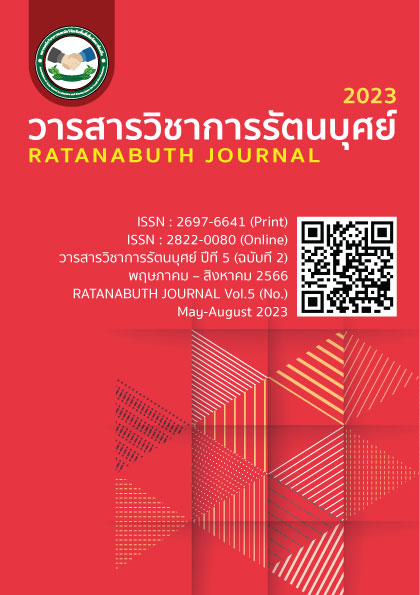Achievement Motivation for Learning Management According to Iddhibaht Principle 4 of Teachers under the Division of Education Saraburi Province Achievement Motivation for Learning Management According to Iddhibaht Principle 4 of Teachers under the Division of Education Saraburi Province
Main Article Content
Abstract
The objectives of this research were 1) to study the level of achievement motivation for learning management according to the Iddharbat 4 principle, 2) to compare the achievement motivation for learning management according to the Iddharbat 4 principle, 3) to study the approach. Promoting the use of computers for learning management according to the principle of influence 4 of teachers under the Division of Education Saraburi Province The research model is a merged method. The target group used in this research were teachers under the Division of Education. Saraburi Province in the amount of 400 people who provide important in-depth information are teachers under the Education Division. Saraburi Province, 7 people, experts 6 photos/person, total 13 photos/person by purposive selection method. The tools used in the research were questionnaires, interview forms. Statistics used in data analysis were percentage, mean, standard deviation and content analysis.
The results showed that: 1) Achievement motivation Level for learning management according to Iddhipada 4 was at a high level overall at a high level, namely 4) Personal Unconcern at a high level, namely work (Work) 2) Gender, age and level of education had achievement motivation for learning management. According to Idthibat 4, the differences were statistically significant at the 0.01 level.3) Guidelines for Promotion of Achievement Motivation for Learning Management According to the Principle of Influence 4 of Teachers under the Division of Education Saraburi province are: Chantha (satisfaction) is having to create an attitude to be satisfied with technology Viriya (determination) is having to try to learn about computers Jitti (intention) is having to study and develop potential. Technology Vimangsa (consideration, improvement, development) i.e., technology capability should be fully developed. Learn to go through each program until fluent. Choose a program that meets the needs of the learners.
Article Details

This work is licensed under a Creative Commons Attribution-NonCommercial-NoDerivatives 4.0 International License.
References
ธีราลักษณ์ ธีรวัจณนาภา.(2561).ปัจจัยที่ส่งผลต่อการใช้คอมพิวเตอร์ ด้านการจัดการเรียนการสอนและด้านการพัฒนาสื่อการสอนของบุคลากรครูในโรงเรียนการศึกษาขั้นพื้นฐานเอกชน จังหวัดนนทบุรี.การค้นคว้าอิสระวิทยาศาสตรมหาบัณฑิต.มหาวิทยาลัยธรรมศาสตร์.
นพมาศ เสียมไหม.(2560). ศึกษาการยอมรับในการใช้เทคโนโลยีสารสนเทศ (e – government) (G๒E) ของข้าราชการในระดับปฏิบัติการกรณีศึกษา สำนักปลัดกระทรวงมหาดไทยกับสำนักปลัดกระทรวงเทคโนโลยีสารสนเทศและการสื่อสาร.การค้นคว้าอิสระวิทยาศาสตรมหาบัณฑิต. มหาวิทยาลัยธรรมศาสตร์.
บุญชม ศรีสะอาด.(2555).การวิจัยเบื้องต้น.พิมพ์ครั้งที่ 7.กรุงเทพมหานคร: สุวีริยาสาส์น.
พิสณุ ฟองศรี.(2549).วิจัยทางการศึกษา.พิมพ์ครั้งที่ 2.กรุงเทพมหานคร: สำนักพิมพ์เทียมฝ่ายการ พิมพ์.
ศรี วงศ์รัตนะ.(2549). เทคนิคการเขียนเค้าโครงการวิจัย: แนวทางสู่ความสำเร็จ. นนทบุรี: บริษัทไทย เนรมิตอินเตอร์โปรเกรสซีฟ จำกัด.
สุวารินทร์ จันทร์เพชร.(2566).ปัจจัยที่มีผลต่อการยอมรับเทคโนโลยีสารสนเทศและการสื่อสารในการพัฒนาการเรียนการสอนของครูในโรงเรียนโครงการหนึ่งอำเภอหนึ่ง โรงเรียนในฝันเขตตรวจราชการที่ 6.การค้นคว้าอิสระวิทยาศาสตรมหาบัณฑิต. มหาวิทยาลัยธรรมศาสตร์
อภิรา นิลรัตน ณ อยุธยา.(2563).ปัจจัยที่มีผลต่อการยอมรับระบบสารสนเทศของข้าราชการสังกัดกองบัญชาการทหารสูงสุด.การค้นคว้าอิสระวิทยาศาสตรมหาบัณฑิต. มหาวิทยาลัยธรรมศาสตร์.
Lee J. Cronbach.(1974). Essential of Psychological Testing, 3nd ed., New York: Harper & Row Publishers.
J. Ritchie and J. Lewis.(2003)., Qualitative Research Practice. London: Sage.


